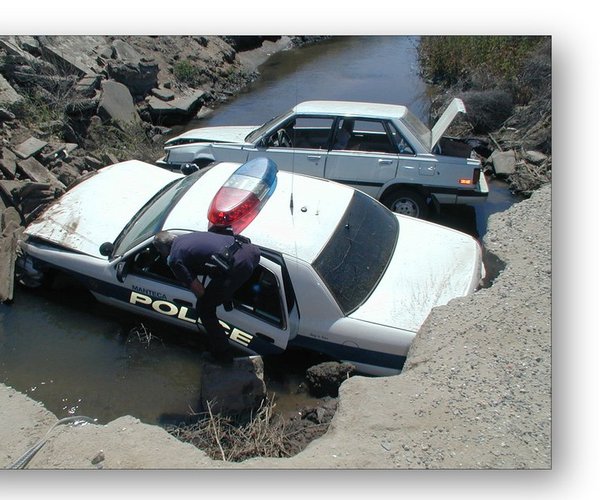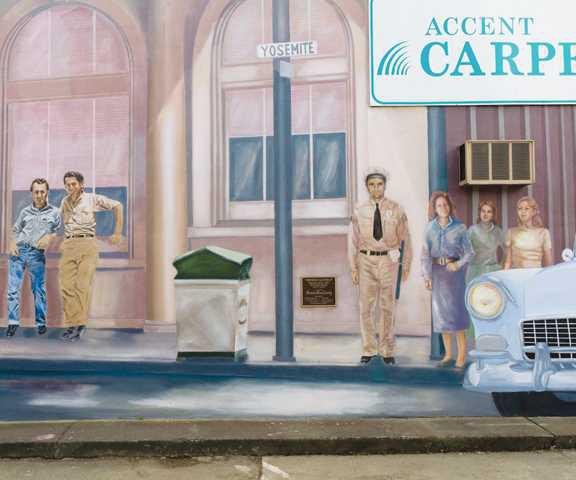Nick Obligacion turned right off of Lincoln Street into the 500 block of Sonora Street on the edge of downtown Stockton driving an unmarked Manteca Police Ford Taurus sedan.
He slowed down to a crawl so the passenger could take in what Obligacion feared was the future for Manteca.
Sidewalks on both sides of the street were jammed with makeshift encampments.
As the Taurus neared St. Mary’s dining hall and drop-in shelter, it got worse — as impossible as that seemed.
The subsequent left turn onto Church Street gave a sweeping view of an older industrial area that for all practical proposes was dead.
There were a few businesses struggling to stay alive amid the squalor created by tents, enough cardboard to fill three recycling trucks, garbage strewn about, and buildings with graffiti so thick it was difficult to determine the actual color of the exterior walls.
The year was 2016.
Obligacion was the Manteca police chief.
Manteca was staring down the barrel of a class-action lawsuit brought by three individuals represented by lawyers with a homeless advocacy organization in San Francisco.
The trio was led by Robert Schuknecht.
Schuknecht, if you were around Manteca in the middle of last decade and don’t recognize the name, was the guy who set up shop blocking the city sidewalk by the driveway entrance to McDonald’s on East Yosemite Avenue.
He’d park a cart with three shelves he pushed his belonging on around town.
Usually, he strummed his guitar when he wasn’t sleeping.
He’d usually let his dog run loose off leash.
For better or worse, Schuknecht forced the city to stop dancing around the growing homeless problem.
The Manteca City Council was being hammered by two large camps of vocal citizens.
On one side were those essentially demanding the homeless either be run out of town or arrested.
The first would be illegal and the second futile.
All arresting and booking the homeless for misdemeanors they committed accomplished in the process of trying to shelter and fend for themselves was doing at the time was creating a never ending cycle of catch and release. That piled up law enforcement and court costs with nothing to show for the expenditures.
On the other side were those that wanted the city to open a drop-in homeless shelter — as long as it wasn’t near their neighborhood.
They would offer advice such as a shelter belonged on Moffat Boulevard by Powers Tract because it was more suitable given it was an “older neighborhood.”
They decried those in Powers Tract that objected as being unreasonable and uncaring.
The class action lawsuit filed against the city on Nov. 13, 2015 alleged the city made being homeless a crime by violating the 4th, 8th, and 14th amendments.
They also faulted Manteca for not having a shelter for single men.
The lawsuit also contended Manteca was targeting the homeless because they were locking the restrooms at Library Park and had shut off electricity to the nearby gazebo to prevent the homeless from charging their phones.
There were those in Manteca that wanted the city to fight the lawsuit.
The writing, though, was more than just on the proverbial wall.
It was virtually chiseled in stone.
Every California city that had taken on such homeless class action lawsuits and fought to the bitter end, meaning having it decided in court, just didn’t lose but they lost big time.
Not only did they have to meet demands but they also typically paid a significant sum of money to the injured parties.
They also racked up legal costs in excess of $1 million. That’s because not only did they have to cover their legal tab but that of the prevailing homeless advocacy organization.
The decision was made to cut Manteca’s potential losses.
They worked with the opposing lawyers and came up with a plan that adhered to 9th District court rulings.
And they took it one step further by creating a police officer position to deal with homeless issues as well as to work with the homeless — and various support organizations — to try and get them off the streets.
It was clear that some form of “shelter” or else a robust homeless service center would be needed or else the homeless numbers would likely just rise.
Obligacion, who repeatedly stressed to people that simply being homeless is not a crime, did his best to steer Manteca away from a drop-in shelter.
The initial emergency cooling and warming centers for the unhoused did not function as a true shelter per se.
The fact Manteca, after reviewing what didn’t work and did work in other cities up and down the state, zeroed on the homeless navigation shelter concept is helping avoid what the police chief showed others on his short drives to Stockton back in early 2016.
It is not a drop-in shelter.
The homeless have to commit to being helped.
And support services are provided to do just that.
The homeless navigation center on target to break ground next year will be more robust than the current emergency shelter in the parking lot at 555 Industrial Park Drive.
It will be secured. Once in the program, they can’t come and go at will.
At the same time, services won’t be extended in such a manner where homeless start camping nearby just to get close to free meals.
In fact, successful homeless navigation centers in cities elsewhere aggressively keep streets clear of “stationary” homeless for a three or so block radius.
Contrast that to the mess in Arizona where voters Nov. 5 passed Proposition 312.
In a nutshell, it requires local governments to compensate business and property owners for damage caused by the failure to enforce crimes associated with homelessness such as public urination, drug use, and vandalism.
What prompted the measure was a deliberate decision by Phoenix officials to allow the homeless to basically take over a section of downtown.
Not only did the city not only take proactive steps to work to reduce the homeless population as Manteca is doing, but they also reportedly told police officers not to pursue “homeless crimes” in the area that is now known as “The Zone.”
That led to small businesses in The Zone suffering, property values plunging, and enterprises going out of business.
The Zone quickly became one of the nation’s homeless encampments.
Last year, property and business owners successfully sued the City of Phoenix on Arizona state court for deliberately creating a public nuisance.
It wasn’t a decision by the courts or the voters that said hell to the homeless.
Instead, it put those victimized by the actions of the lawlessness of homeless on the same playing field when it comes to their rights.
It is clear the homeless have the right to live.
But it also clear other people have rights as well.
And given no one’s rights are ever absolute given people interact with each other, the course of action cities need to take must wed enforcement of laws with efforts to help people get off the street.
That said, there is no law that says the homeless have the right to run wild or court decisions that extend them sacred cow status.
This column is the opinion of editor, Dennis Wyatt, and does not necessarily represent the opinions of The Bulletin or 209 Multimedia. He can be reached at dwyatt@mantecabulletin.com






